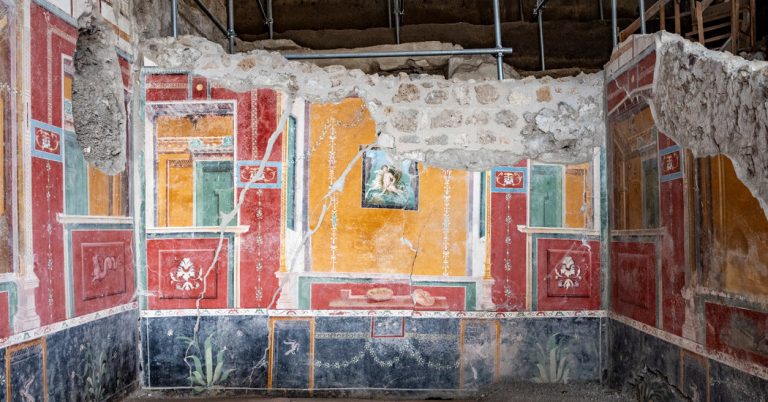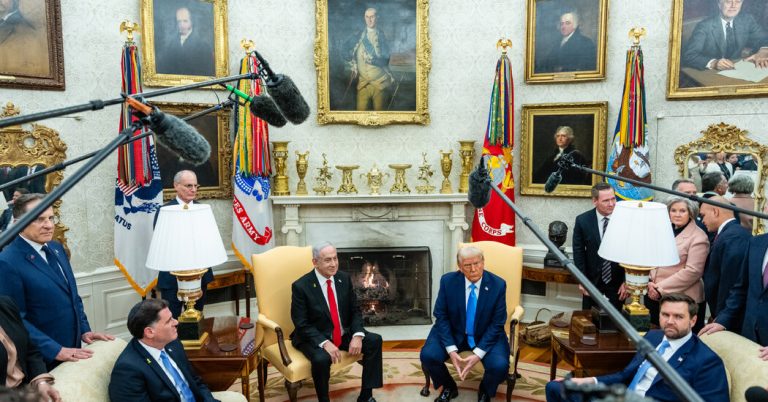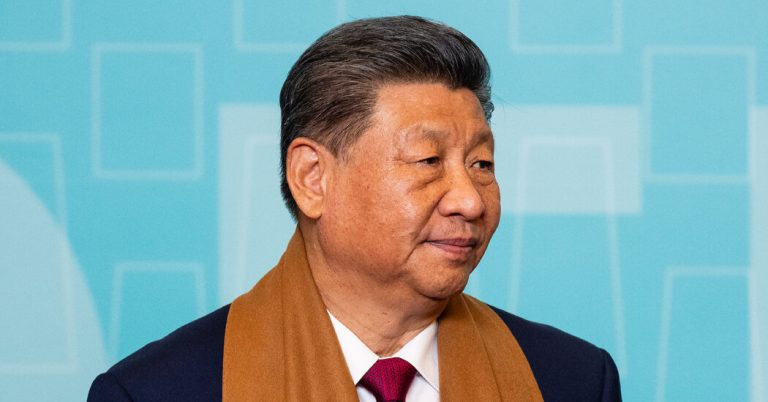When Charles McGonigal, a former counterintelligence chief with the Federal Bureau of Investigation, was accused of using his position to benefit an associate’s business in Eastern Europe, it represented a startling turn for a high-ranking official who had been entrusted with access to some of the most sensitive secrets held by the American intelligence community.
But it also set off a scramble within the bureau to assess the potential damage and determine whether any counterintelligence or law enforcement operations were compromised, according to two people familiar with the review.
“It puts a question mark next to everything he was involved in,” said Holden Triplett, a former F.B.I. counterintelligence official who left in 2020 and co-founded Trenchcoat Advisors, a risk management consultancy.
“You’d be trying to figure out, ‘OK, when did this start and what did he touch after it started?’” said Mr. Triplett, who does not have direct knowledge about the review of Mr. McGonigal’s career. “Going back and thinking about what the damage could be is painful.”
Inside the F.B.I., where he spent 22 years, Mr. McGonigal was so trusted that he was tapped to run the investigation into a devastating breach that led to the imprisonment, execution or disappearance of more than a dozen Central Intelligence Agency informants in China, one of the F.B.I.’s most sensitive assignments.
The episodes described in a pair of indictments unsealed last week by federal prosecutors in Washington and New York paint Mr. McGonigal, 54, as aggressively entrepreneurial in seeking to generate business through the contacts and power his position afforded him, operating almost in plain sight without being detected despite the danger that someone with his knowledge could pose if corrupted.
While still at the F.B.I., he developed a relationship with Prime Minister Edi Rama of Albania and took steps to benefit the politician, according to the prosecutors in Washington. Mr. Rama has portrayed himself as a reformer and as opposed to Russia’s war in Ukraine. But after his 2018 retirement, Mr. McGonigal worked the other side, on the payroll of a sanctioned Russian oligarch, Oleg Deripaska, once seen as a member of President Vladimir V. Putin’s inner circle, according to the indictment of Mr. McGonigal and another man, Sergey Shestakov, in New York.
An attorney for Mr. McGonigal, Seth D. DuCharme, did not respond to a request for comment. But after last week’s indictments, he said Mr. McGonigal had “served the United States capably, effectively, for decades,” and that his legal team looked forward to reviewing the government’s evidence.
The earliest crimes of which Mr. McGonigal is accused date to August 2017, but the F.B.I.’s damage assessment likely is looking back much further, former officials said. That he may have lied while with the bureau about his acceptance of cash from a business associate and contacts with foreign individuals has also raised concerns about the breadth and duration of his possible deceptions.
Mr. McGonigal retired from the F.B.I. in 2018 as the special agent in charge of counterintelligence in New York, reporting to the field office’s director. Counterintelligence, which in the F.B.I. focuses on identifying and rooting out foreign intelligence gathering on U.S. soil, is particularly crucial in New York, where the presence of the United Nations and numerous diplomatic missions present ample covers for would-be spies.
Mr. McGonigal’s high-ranking role would have given him a wide view of what was happening across the agency and intelligence community, and involvement in strategic decisions like where to point squads of ground-level special agents, former officials said. It would not generally require extensive international travel, involve meeting with heads of state or entail direct involvement in ongoing investigations, all of which Mr. McGonigal is accused of doing.
“You’re talking about four levels above the actual investigators,” said Clayt Lemme, a former F.B.I. official who oversaw counterintelligence at the bureau’s Washington office. “Under normal circumstances, he wouldn’t be involved in the day-to-day decision of opening a case or closing a case.”
Mr. McGonigal’s willingness to meet with the head of state in Albania, a country that has an American diplomatic presence, suggests he was not keeping his involvement there a secret from colleagues, former officials said. He also used his F.B.I. email address and phone for Albania-related matters, a person with insight into the investigation said.
But whatever official pretext Mr. McGonigal might have for those trips and associations could also have served as a cover for more questionable activities, others said.
That the suspected crimes occurred shortly before his retirement suggests Mr. McGonigal might have started or increased illicit activities after taking the last of his required polygraph tests, which are supposed to be administered every five years. Mr. Triplett said the betrayal of the agency by someone of Mr. McGonigal’s stature for $225,000, if proved, would be surprising given that former officials can earn significant sums as consultants after retirement, on top of hefty pensions.
But it would not be unprecedented. Robert P. Hannsen, the F.B.I. agent turned spy who fed classified information to Russia for two decades and is serving a life sentence, began cooperating with the Russians in the late 1970s while in a counterintelligence unit in New York.
The Washington indictment details how, over two years, Mr. McGonigal submitted false financial disclosures to the F.B.I. The forms omitted his acceptance of payment from a New Jersey businessman who was a former employee of an Albanian intelligence agency as well as free international travel. Prosecutors said Mr. McGonigal also lied about his travel destinations and interactions with foreigners on forms he was required to complete and took actions that appear to have conflicted with his government duties.
In August 2017, prosecutors said, he met with Agron Neza, the New Jersey businessman prosecutors described in the Washington indictment as Person A. Other than Mr. Deripaska, the people mentioned in the indictments of Mr. McGonigal were not named. The New York Times identified them through public records and interviews with people familiar with the case. Some were also listed in a portion of a federal subpoena from the investigation of Mr. McGonigal that was published by Insider, an online publication, last year.
Mr. Neza, 59,was born in Albania and employed by an intelligence agency there several decades ago, prosecutors said. He later moved to the United States, settled in northern New Jersey and became an American citizen. He has not been accused of any wrongdoing.
At the August 2017 meeting, Mr. McGonigal asked Mr. Neza for money, prosecutors said. They did not detail how the men met, characterize their relationship or reveal the reason for the request. But in the New York indictment, Mr. Neza is referenced as Mr. McGonigal’s friend. In the months after Mr. McGonigal asked for money, the men made multiple trips to Europe, where Mr. McGonigal seemingly used his position in efforts to generate business for Mr. Neza, prosecutors suggested in the Washington indictment.
In September 2017, the men traveled to Albania, prosecutors said, where Mr. Neza introduced Mr. McGonigal to Dorian Ducka, a former Albanian official serving as an informal adviser to the prime minister, Mr. Rama. Mr. Ducka, described in the Washington indictment as Person B, brought Mr. McGonigal to see Mr. Rama. Neither Mr. Neza nor Mr. Ducka could be reached for comment.
Along with giving Mr. Rama F.B.I. paraphernalia, Mr. McGonigal appears to have tried to sway the prime minister toward awarding an oil-drilling license to an entity affiliated with Mr. Neza and Mr. Ducka, prosecutors suggested.
Mr. McGonigal also seemed to try to aid Mr. Neza in making deals with an Albanian politician and businessman who wanted the F.B.I. to investigate what he said was a plot on his life, the Washington indictment says.
After meeting the man, Mr. McGonigal arranged on a subsequent overseas trip for a U.S. prosecutor to interview him in Austria, using Mr. Neza as his interpreter. Prosecutors suggested the meeting was a sham; there was no official record of the interview and Mr. Neza was not paid for the work. On the same day, Mr. McGonigal and Mr. Neza flew to Albania, where they met the politician and discussed business opportunities, the indictment said.
That fall, Mr. Neza gave Mr. McGonigal $225,000 in cash in three installments, according to the indictment. Mr. Neza made one of the payments inside a parked car in New York City, and the others at his home in New Jersey, prosecutors said. Mr. McGonigal promised to pay the money back, according to the indictment. Prosecutors have not charged Mr. McGonigal with taking any official action in exchange for the payments.
In November, after Mr. McGonigal again met with the prime minister and Mr. Ducka in Albania, he contacted the same prosecutor who had been with him in Austria about a potential investigation into a lobbyist that Mr. Rama’s political opponent had hired to gain access to and support from President Donald J. Trump.
The events detailed in the indictment and other public records seem to match the description of the lobbyist Nicolas D. Muzin.
Only days before Mr. McGonigal contacted the prosecutor, on Nov. 14, Mr. Muzin filed a report with the Justice Department disclosing his lobbying for the Democratic Party of Albania, the center-right political party challenging Mr. Rama. The party was headed by Lulzim Basha, who had cast himself as a backer of Mr. Trump.
Through early 2018, Mr. Neza continued to pass along information — some of which came directly from Mr. Rama’s office — about Mr. Muzin to Mr. McGonigal, according to the Washington indictment. Mr. McGonigal would then forward the information to others in the F.B.I. office in New York.
In late February, the F.B.I. formally opened an investigation into the lobbyist “at defendant McGonigal’s request and upon his guidance,” according to the indictment. Mr. Neza was among the confidential sources who provided information during the investigation, and Mr. Ducka paid for witnesses in Europe to travel to a meeting with the F.B.I., the indictment says.
Throughout, Mr. McGonigal failed to disclose his contacts with Mr. Ducka or his financial relationship with Mr. Neza, prosecutors said. It was not clear if the Justice Department took additional steps to investigate Mr. Muzin, and no charges have been brought against him. Mr. Muzin said in a statement that he had “no reason to believe that I was the victim of this false investigation. But if I was, that is unfortunate, and I hope that justice will be served.”
In his final months at the F.B.I., Mr. McGonigal made at least one more effort to use his influence in an apparent attempt to help Mr. Neza, according to the Washington indictment. He met in Germany in April 2018 with two men from Bosnia and Herzegovina, prosecutors said, one of whom, described in the indictment as Person C, was an adviser to a senior Bosnian elected official. The other, Person D, had founded a pharmaceutical company.
The men asked Mr. McGonigal to help them meet with the U.S. ambassador to the United Nations or another diplomat to discuss receiving American support on a political issue not specified in the indictment. Mr. McGonigal proposed to Mr. Neza that he negotiate a contract to be paid $500,000 by the pharmaceutical company in exchange for the diplomatic meeting; in a message, he asked Mr. Neza to “protect” his name while trying to make the deal, according to the indictment.
The men went forward with the plan, and Mr. McGonigal tried to arrange the diplomatic meeting, the indictment says. It does not indicate whether the contract was executed, the payment made or the meeting held.
After leaving the F.B.I., Mr. McGonigal went to work for Mr. Deripaska, the sanctioned oligarch, according to the New York indictment. But it was not his first encounter with Mr. Deripaska’s circle.
Prosecutors suggested that Mr. McGonigal began wooing Mr. Deripaska shortly before his retirement. In 2018, he helped the daughter of an employee of Mr. Deripaska get an internship with the New York Police Department, according to the New York indictment. Mr. McGonigal explained to another F.B.I. official that the girl’s father was a Russian intelligence officer he wanted to recruit, prosecutors said.
In 2019, after his retirement, Mr. McGonigal introduced Mr. Deripaska to a law firm that would seek to get his sanctions lifted, and Mr. McGonigal was paid $25,000 a month through March 2020 by Mr. Deripaska through the law firm as a consultant, according to the indictment. The work stopped at the beginning of the coronavirus pandemic.
In 2021, Mr. McGonigal and his associate, Mr. Shestakov, negotiated a deal — with the Deripaska employee whose daughter got the police internship — to work for Mr. Deripaska to investigate a rival oligarch.
Mr. McGonigal and Mr. Shestakov, who are charged with violating U.S. sanctions and money laundering, were paid $218,000 over three months from a shell company in Cyprus through a Russian bank, the indictment says. Mr. McGonigal arranged to receive payments through a friend’s company in New Jersey, forging the friend’s signature on a contract, prosecutors said.
That friend was Mr. Neza, the Albanian-born businessman who is at the center of the charges brought by Washington prosecutors, according to a person familiar with the investigation.
But Mr. McGonigal’s friend was apparently not aware of his work for Mr. Deripaska. When Mr. Neza asked about the source of the wire transfers from a Russian bank, prosecutors said, Mr. McGonigal replied that he had done some “legitimate” work for “a rich Russian guy.”
Mr. Neza agreed to transfer the money, prosecutors said.
Adam Goldman contributed reporting. Susan C. Beachy contributed research.









